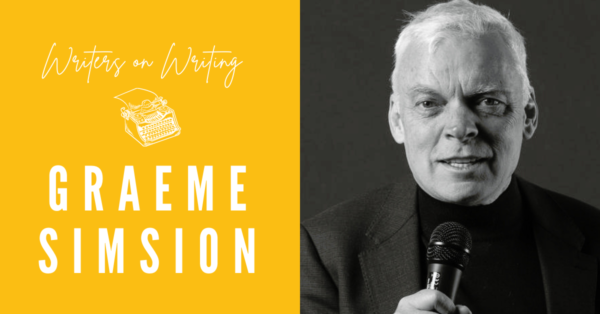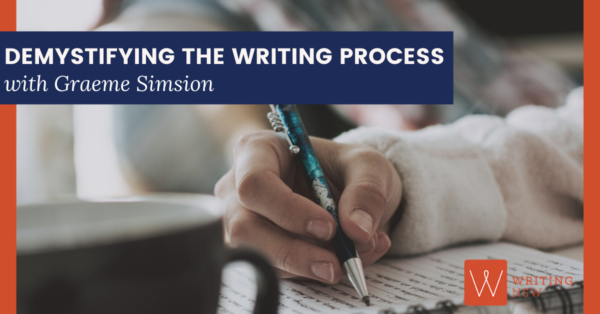
This is a brand new course and this is your first time teaching at Writing NSW. What can participants expect from Demystifying the Writing Process?
New course, first time…should you be worried? You’ll be relieved to know it’s not my absolute first time: I’ve been teaching writing – to classes, seminars, and as a one-on-one mentor – for a few years now. That, and The Novel Project, were probably inevitable: all my working life, I’ve taught the things that I’ve learned. My 1994 book on data modelling is still in print and I supported myself during my writing studies by teaching consulting skills around the world. We should be fine.
What I want you to take from the course is a process – mine, yours or, likely, a combination of the two – which will enable you to write the best novel, memoir, or bio that you’re capable of. I won’t teach you to write better sentences, but I will show you how to organise your work so that you begin each day knowing what you have to do, how to do it, and with confidence that you’re making progress towards a finished project.
What you can expect on the day is:
- Brief introductions – time will be at a premium. Come with one question you’d like answered and we’ll get that on the table from the start (of course there will be a chance for more later).
- An overview of the advantages of having a process, of working top-down (more or less) and of focusing on one thing at a time. It won’t be an extended argument: if you are a committed ‘pantser’, determined to make it up as you go along, this is not the seminar for you!
- Some principles, tips on living the writing life and advice on managing the creative process (my PhD was in this field, so it’ll be more than just ‘this worked for me’). Plus we’ll look at the concepts of structure, as background rather than prescription (that’ll come later).
- The bulk of the course: A journey through the writing process, from premise to proofreading. We’ll follow the shape of The Novel Project – your take-away notes. It’ll be a helicopter view, but we’ll take the chopper down as we need to for examples and questions. At every stage, I’ll aim to give you at least one technique you may not have seen before: a tool for creating original premises; a way of exploring character; what instructions to give your beta readers.
We’ll do questions and discussions throughout. No exercises. No writing. It’s big-picture stuff.
What’s the most surprising misconception about writing a novel, memoir or biography?
Writing is easy: you just stare at a blank sheet of paper until drops of blood form on your forehead. The idea that you ‘make it up as you go along’ is at odds with almost every other profession and artistic discipline. A few talented people can work that way, but innumerable who can’t have abandoned projects that they could likely have completed with a more organised approach. That’s what The Novel Project and this course is about.
On a related note: (you need to) write every day, is, for most of us, bad advice – unless you take ‘write’ to mean ‘do something related to your project’ or ‘keep in practice by writing other things at the same time’. Drafting is just one stage of a writing project: there’s a time to create characters, a time to edit, a time to work on plot problems… You can have a productive day without writing a word.
You didn’t start your writing career until you were fifty. What advice do you have for writers who are also starting a bit later in life?
Lucky thing too, or I’d have inflicted some immature writing on the world – or at least prospective publishers. I was fortunate enough in those fifty years to have gained proficiency / expertise in another field – indeed in a few fields. I was able to bring a lot of that experience to my writing – as subject matter (my Rosie Project hero is an academic, and I’d done a stint in academe; Adam Sharp is a database administrator, which conveniently, I’d been; Rosie has to search for her biological father amongst doctors – I’m married to one). Life experience trumps research every time in creating characters.
But the most important thing I brought to my new career was an appreciation of what it had taken to become proficient at something substantial. I knew how hard and for how long I’d need to work, how to be an effective student, how to handle feedback, how to balance theory and practice… Most of the younger aspiring writers didn’t have that, and many underestimated the task.
So, if you’ve been a database administrator, or a nurse or a veterinary acupuncturist…be ready to do the sort of work that got you there – again. That’s advice I can’t give to a twenty-year-old.
And, with a bit of luck, you may have many years ahead of you, possibly without the burden of a day job. Remember that the wunderkinds have (by definition) been working only a short time – you’ll catch up, and the time will fly by!
*
Graeme Simsion is the internationally bestselling author of The Rosie Project, The Rosie Effect, The Rosie Result and The Best of Adam Sharp. He lives with Anne Buist, co-author of Two Steps Forward and Two Steps Onward, in Melbourne, Australia. The Novel Project will be released March 2022.
Join Graeme for Demystifying the Writing Process, Saturday 5 March 2022, 10am-4pm. Enrol here >>

If you want to be the first to read great advice from our incredible tutors, subscribe to our weekly e-newsletter Newsbite.
More from Writing NSW
Check out our full range of in-person writing courses in Sydney, our online writing courses and our feedback programs to see how we can help you on your writing journey. Find out about our grants and prizes, as well as writing groups across NSW, and sign up to our weekly newsletter for writing events, opportunities and giveaways.
